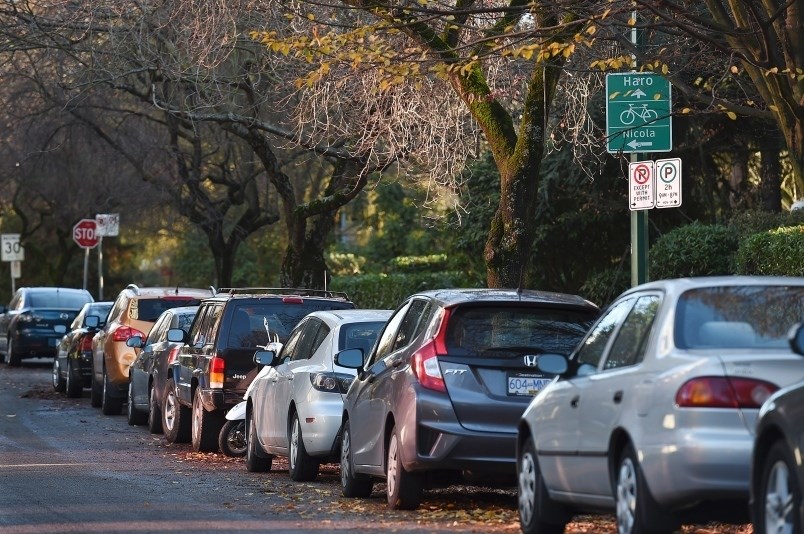City staff’s goal is to have a city-wide parking permit program in place before the end of the year, but first wants input from residents before it presents a detailed plan to city council in the months ahead.
The city launched a survey Wednesday on its website.
Paul Storer, the city’s director of transportation, said the aim of the survey is to get a better sense of what residents’ concerns are related to on-street parking and the appetite to pay for a permit.
“We’re in the process of thinking what the options might be, and the feedback will help us narrow down what at least a first step in the program might be, hopefully later this spring,” Storer said.
“Transportation accounts for about 40 per cent of the carbon generated in the city, so it’s a big area of focus for us. And as a city government, we have a lot of levers there, and we can implement change faster than we can in a lot of other areas.”
City council agreed to the concept of a city-wide parking fee program in November 2020 when it approved a $500-million climate action plan, which aims to cut natural gas heat in existing buildings, discourage vehicle use and find less polluted ways to produce and transport construction materials.
The parking program also calls for drivers of new higher-end vehicles to be charged on the carbon intensity of their vehicle, with the anticipated threshold to be a vehicle that costs $40,000 to $50,000.
Storer said the intent of the program is to make it easier for residents, visitors and contractors to find parking, encourage people considering a new vehicle purchase to buy electric and free up street space for all to use.
“Essentially, those people who can’t afford to, or don’t own a vehicle to some extent are subsidizing the parking for everyone else,” he said. “There’s a real cost to that street space that’s being taken up by all the cars parking on it.”
Currently, approximately 10 per cent of city streets — mainly downtown and surrounding neighbourhoods — are covered by parking permits paid for by residents, at an average cost of $45 per year.
It’s $400 a year in the West End for new applicants.
That fee isn’t expected to change, but rates for neighbourhoods where there is no permit parking, Storer suggested residents with vehicles would be charged at or below $45 per year, depending on areas of the city.
“That’s something we still need to sort out,” he said.
Craig Ollenberger, a director with the Grandview-Woodland Area Council, has a car that he parks on the street in his neighbourhood near Venables Street and Victoria Drive.
Ollenberger doesn’t pay for a permit, whereas some of his fellow directors live on streets where they do. Having a car, he said, is more convenient for his family than relying on transit.
“Part of the reason I have a car is because it sits there for free,” he said. “Transit is quite expensive when you talk about a family of five, and it’s not that frequent.”
Ollenberger said he understands the push by the city to reduce residents’ reliance on the automobile, noting he was surprised it’s taken Vancouver this long to consider a city-wide parking fee program.
He believes the program will be an easier sell to the public, if it’s not simply a cash grab and all revenue is directed to green initiatives in neighbourhoods.
“Make this revenue neutral and make sure that the funds that you raise really are kept very locally, even on the order of a few blocks,” said Ollenberger, who urged city staff to consider open houses on the plan when public gathering can resume.
“A survey, or some electronic feedback response — that’s one thing. But we’d like to see them do a deeper consultation that’s actually in person, that’s free and accessible, where people can discuss things.”
The city has promised that if the program generates revenue that money will be used to help fund “climate emergency actions” in the climate plan, according to information on the city’s website.
Other considerations facing city staff — and ultimately city council — will be how to implement a city-wide parking permit program in a city where dozens, if not hundreds of people live in recreational vehicles on city streets.
Coun. Christine Boyle said in an email that she didn’t anticipate the program would impact people living in their vehicles, which is evident in areas around Strathcona Park, along the Terminal Avenue corridor and near Lowe’s home improvement store off Renfrew Street.
“When residents have no other option but to live in a vehicle, our approach needs to be helping connect them to services and find stable housing, rather than further penalizing them,” said Boyle, noting the needs of low-income people and residents with mobility challenges are priorities for her when implementing any plan.
@Howellings



